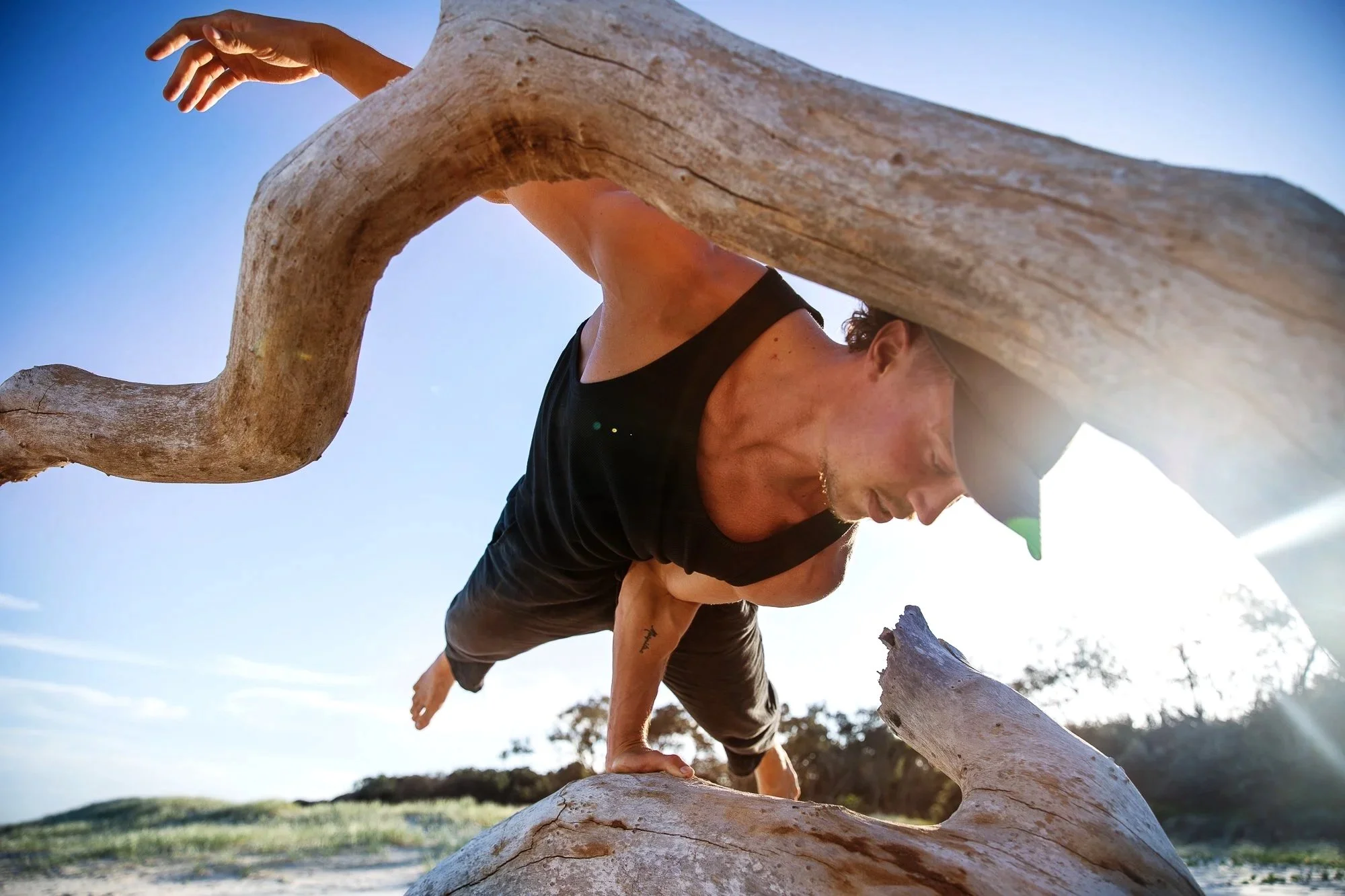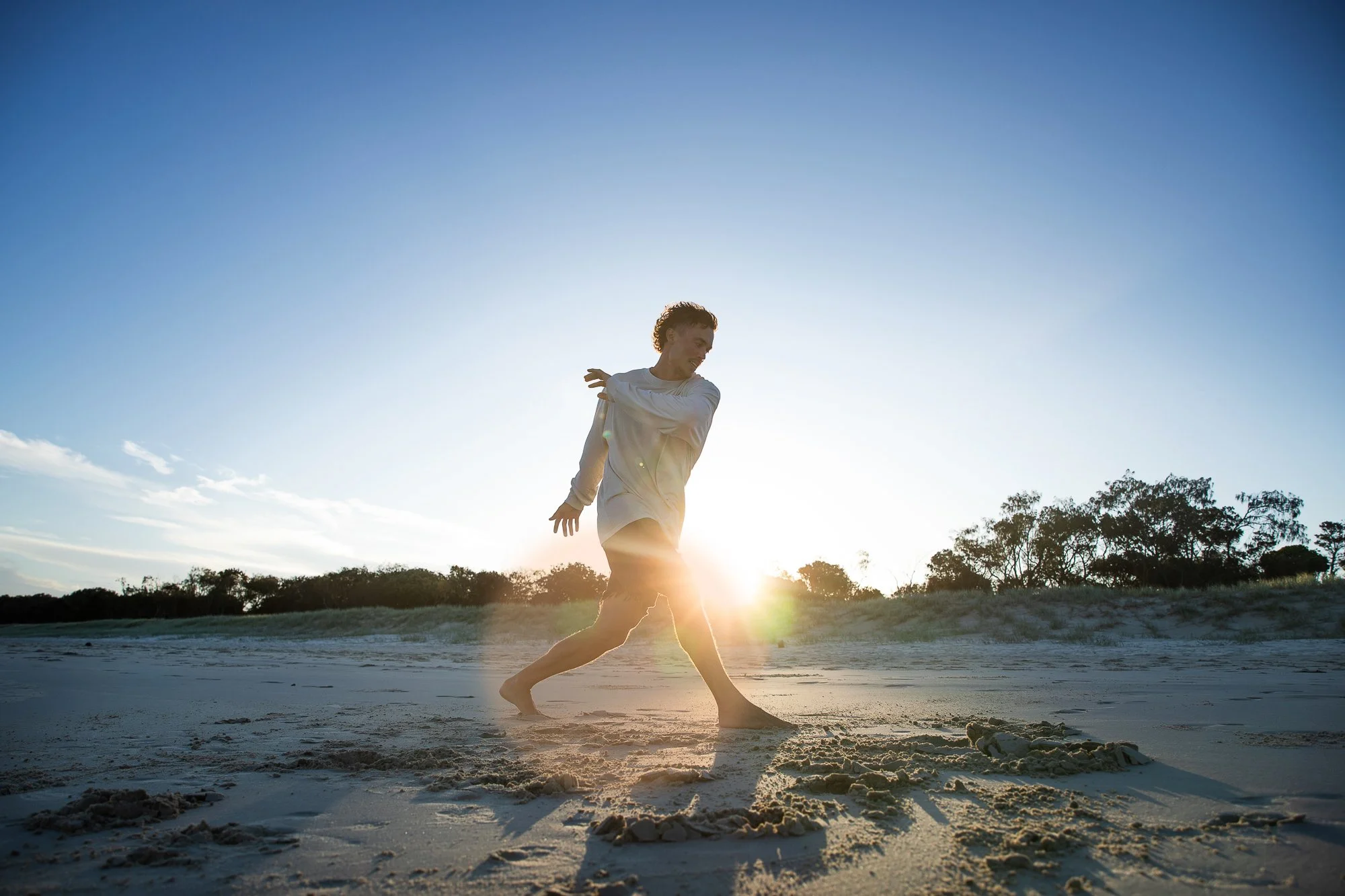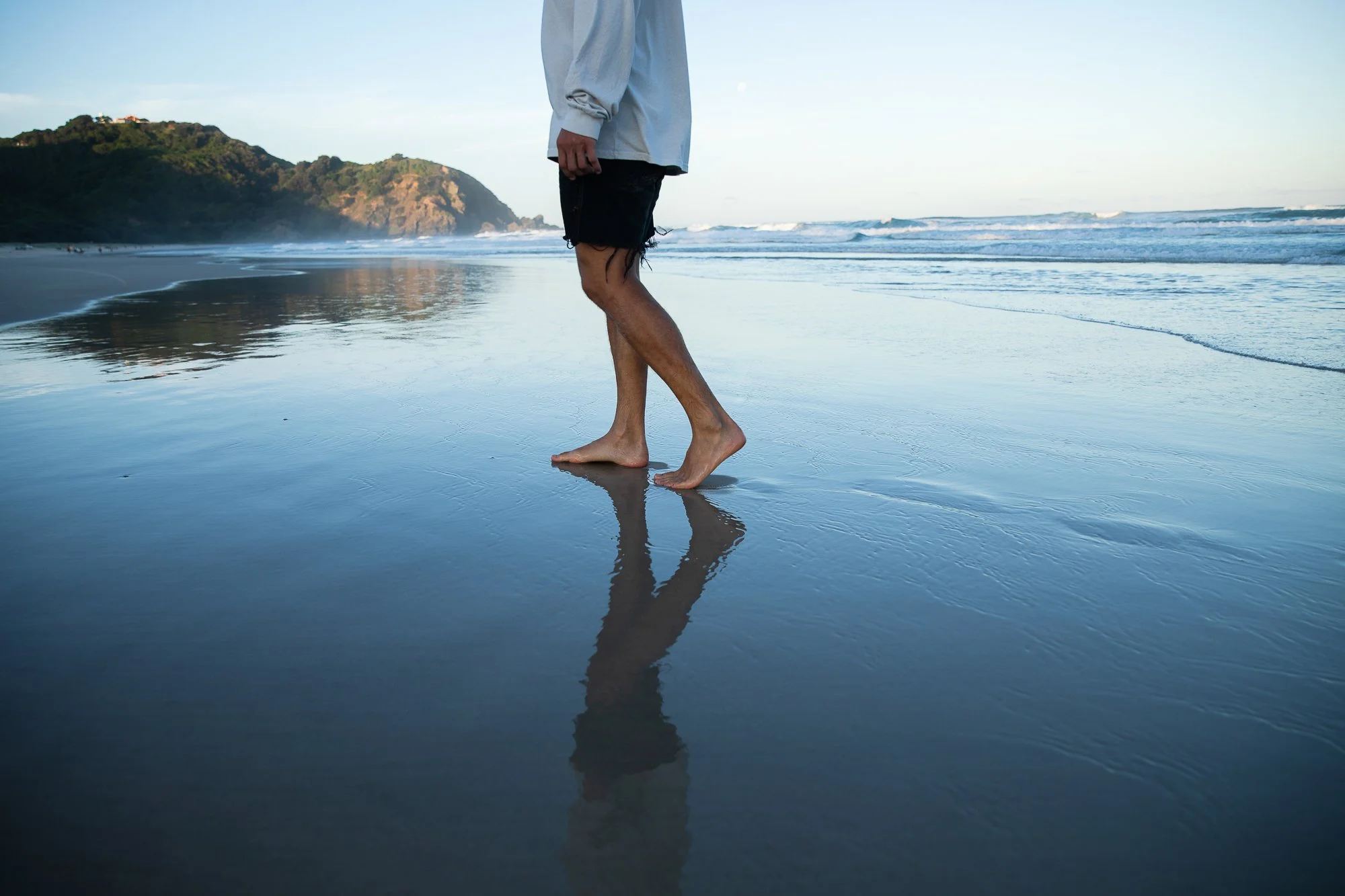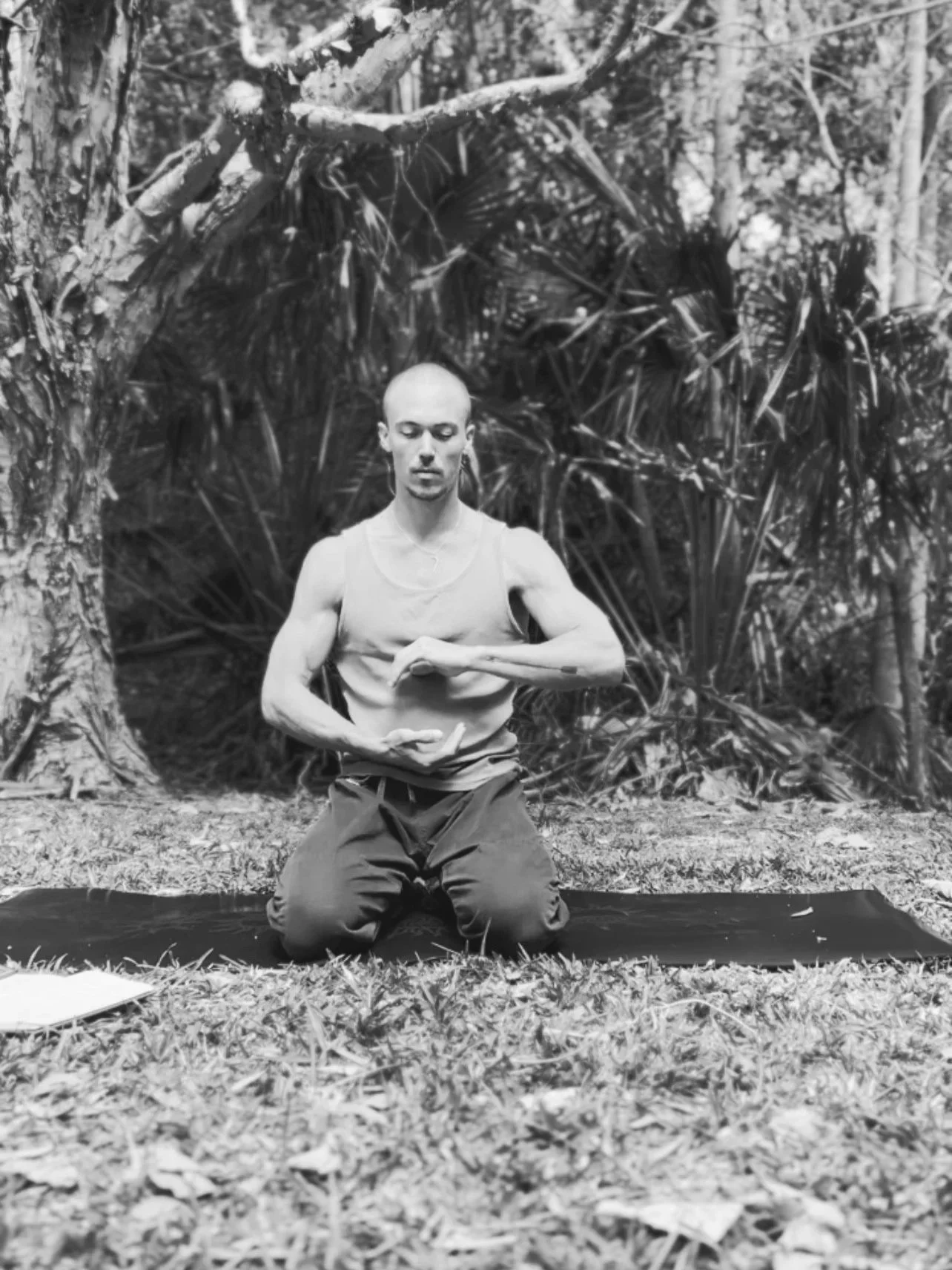I specialise in potent, energising and therapeutic physical training.
To prepare your system to access paradigm-shifting levels of love, leadership and creativity.
My mission is to empower self-driven, multi-dimensional way makers.
I walk shoulder-to-shoulder with those of you who stretch yourselves between heaven and earth, to bring beautiful visions to life and create systems that serve humanity’s heart.
My talent is to reveal your strength — and your fragility.
Because until you claim and leverage both, you are not being who you could be.
In building a comfortable, strong, energised body, what felt impossible to realise becomes near-inevitable.
Who I am
I am someone who has been broken down and rebuilt — by pressure and responsibility.
Softened by unexpected tenderness and synchronicity.
Known through achievements in sport, movement, speaking and coaching.
I’ve had the honour of advising some elite peers and many who are on their way. Some are athletes; others are founders; others, facilitators. All lead or model in some way — for their children, their teams or their friends.
Over the last 15 years I’ve had wonderful mentors. Teachers, trainers, therapists, animal trainers and embodied entrepreneurs. I’ve been shaped by around 20,000 hours spent in either practice, apprenticeship, independent study or coaching. Other noteworthy teachers include my own pride, doubts and delusions, which, when necessary, lead me to grief — the revealer and master-teacher who reminds me that a deep love for humanity is more important than any knowledge. Desperation becomes humour, then exhalation and finally inspiration.
My movement background involves periods of intense specialisation, often to a decently high level, which helps me develop in new areas quickly. Athletics, freestyle BMX, mountain bike racing, surfing and water sports, rugby union, olympic weightlifting, gymnastics strength training, CrossFit, yoga, Ido Portal Method, bouldering, jiu jitsu and qigong, to name some.
My formal education is in philosophy and certifications in various modalities of physical training. My passion for the last decade has been a somatic/psycho-spiritual approach to movement, for its life-giving effects.
My teaching approach is:
1. Humanistic: as Jung said — “Know all the theories, master all the techniques, but as you touch a human soul be just another human soul.”
2. Ecological / Constraints-Led: creating contexts for students to become autonomous problem-solvers, rather than disciples or drones
3. Principle-Driven: zooming out and distilling universal threads to enrich practical application and achieve integrative results
4. Minimalistic / Taoist: focusing on revealing what is essential and avoiding unnecessary jargon or intellectualisation
My primary offering is always my presence and humanity.
I am a forever student, enabling his lifestyle through teaching. Business is of course a necessary part of that.
My role here is to support you, as you:
Pass through fear into possibility
Access the dormant potential of your body, energy + psyche
Become adept in the subtle art of decision, action and relationship, to live an incredible life
The art is to forget. To forget how to be in our own way.
To surrender to being human — without resigning ourselves to suffering.
To return to radical intimacy with feeling, with sensation, no matter how or where it arises.
Movement, relationships, work, creativity are all different playgrounds.
In each of them, there is a door leading to primordial presence.
Every person, place, practice or perspective serves as a reference, pointing to the quiet wholeness beneath.
We meet where fear dissolves and truth simply is.
Where self-concept dissolves upon contact with essence and presence.
Where there is nobody left for resistance to grip — just pure, flowing, timeless focus.
This is what it means to become attuned.

The Deeper Goal
Viscerally experiencing the unknown as a gift — not a threat
Elite level humans know that to shift an external paradigm, they have to shift their own, first.
If sincere effort was enough, you’d already be there.
Thriving at the next level will require tremendous levels of energy, precision and capacity.
It’s impossible to shift paradigms if you’re fighting what is, resisting life’s inherent unknowns, or gripping current perceptions so hard that there’s no space to adapt.
Over time, these patterns cause chronic stress, inflammation and illness. More superficially, they present as lingering painful injuries, symptoms that don’t heal, and residual bodily tension that keeps creeping back. Some compensate by doing more. Others, by pulling back. Neither addresses the pattern, and both sabotage potential.
Another problem often emerges here: a fixation on finding the root cause — diving down rabbit hole after rabbit hole, trying method after method to find the one trademarked system to rule them all. These systems aren’t the problem. They all offer some insight.
It’s the energetic dynamic that needs to change.
Your current state tells us more about your present expectations, than your past experiences.
Our work is to dissolve the anticipation of suffering — and the urgency to fix it in advance — by attuning to ourselves in the now.
The problem arises when we’re stuck in unconscious, conditioned nervous system responses.
These become embedded into the body not conscious choice, but by instinct — often at an early stage in development. And since instinct is fear-based, it will never be affirmed, forced or decided away through intellectualisation or will-power alone. It’s far too primal.
This fear must be met and transmuted, not fed.
For this, we need relationships.
Embodied guides.
New experiences that involve all layers of the being: bodily, energetic, psychological, social.
You never change things by fighting the existing reality. To change something, build a new model that makes the existing model obsolete.
— Buckminster Fuller
My work helps tenacious creators expand their capacity for expansive, creative decision-making. It’s body-based, and feels like forming new, expansive experiences that shift the whole being from protection to enjoyment, again and again. This is real capacity building. Not performative output.
And we repeat it until new defaults are established and unmet potential feels enticing.
The beauty of being tenacious and vision-driven is that you’ll encounter endless limitations on the path. If you continue on despite this, you’ll learn that limitation paradoxically isn’t an impediment, but a teacher. Don’t settle for your limitations but do honour them, and bring forth every part of yourself for a solution. Not to push through, nor shrink, but to refocus on pursuing next-level love, leadership and creation, no matter what.
The great human work is not to arrive anywhere other than right here.
The unfolding, unknown path is the point.
I’m not here to fix you or to free you. Not at all. Our work is to observe, nourish and build new neural pathways so you can emit a new energetic signature, attracting life-changing opportunities — or seeing them where they were previously invisible to you because you weren’t ready to see them.
This is identity transforming work, and there are three interwoven aspects:
BODY — train the physiological capacity required to stop seeing the world through the lens of “safe and correct” and start magnetising what’s “interesting and fun”.
ENERGY — identify the signs of unconscious resistance so you can consciously transmute it rather than push through it and embed it more deeply into the nervous system.
PSYCHE — reveal your worldview and its origins, then update it to create your individual code that honours reality whilst enabling paradigm-shifts in your life.
The result is a fulfilling, profoundly human journey, encompassing the way you move, think and sense the world as a whole.
Presence and aliveness, everywhere.

My Story and Ethos
In nine parts
1
My earliest memory.
I’m sitting in a golden, sunlit room.
I can feel warm light on my face, and I’m cradled in the cool, ever-so-soft embrace of a heaped duvet.
My wide eyes follow tiny dust particles, suspended in the sunbeams as mum changes the bedclothes. They spiral in the turbulence of the sheet-flapping, then float into pockets of stillness.
I can’t hold it anymore — I’m overwhelmed with a rich, glowing urge to express myself.
Brimming, bubbling, saturated sensation that makes me want to move and sound.
I was filled with love. With beauty. Perhaps with truth.
But concepts like this meant nothing to me in that sweet eternal moment. I was pre-verbal, pre-conceptual, and wholly content, having no concept of myself, or of time. My entire world was what I could see and feel.
I knew nothing about myself.
And yet my experience was more vast than space.
2
Years later, my formal education was well underway, and I learnt to stiffen in every way: to sit still, force myself to focus and memorise abstract information that had no experiential reference point. I was taught to ignore my body’s urges to move and explore — even fighting the urge to pee until the bell rang.
It was apparently so important to learn to operate in this way.
And so every year that passed, more was expected.
Dad would say “you’re 13 now — not a kid anymore!”
Then next year “you’re 14 now — time to get it together!”
Then “you’re 15….”
And it went on, and on, until I developed a subtle resentment about getting older.
It felt like becoming more of what others wanted me to be, and less of who I really was.
But they knew what was best, right?
They spoke with such confidence — in the absence of curiosity.
I’ve since realised that those I deeply admire have one thing in common. Transparency, curiosity, humour, logic and discipline. Real confidence comes from curiosity — because wisdom grows only where the soil is fertile. And real integrity in leadership comes from transparency and humour. Because to lead, you must be able to face yourself, and if you can’t have a laugh, you simply won’t be able to stomach what you discover.
Anyway, I digress.
3
As a youth, I loved learning everything. Music, science… all of it.
But as it goes, I had to choose a pathway, so I went with arty, creative subjects.
They gave me an outlet to express what I noticed about my world, playfully, across different mediums. With art, I could place concepts or, let’s say “experiential hunches” outside of myself and relate or interact with them as material things.
I loved anything scientific too — in the realms of biology and physiology… because… bodies are incredible, and true science is bloody magical. But I didn’t do so well after moving schools a few times and butting heads with a couple of weird teachers.
So English and Philosophy became my main things — and I was blessed with the encouragement to truly listen while reading or conversing; setting aside preconceptions to understand perspectives I initially disagreed with. To try to place myself inside someone else’s worldview, and to place truth above being right.
A foundational skill to have in any conversation, especially the emotionally charged ones!
Two or three fantastic teachers pushed me to dig for the subtext and implications hidden within language. “What is really being said here?” or “What do they mean by that?”
Through my days at Melbourne High and The University of Melbourne, my logical, analytical side was able to stretch itself to the fantastic, mysterious horizons of knowledge — but something was still missing.
The body.
I almost applied for Law School, but didn’t. I realised I was physically repulsed by the prospect of being buried in books and laptops for another four years. My growth wasn’t going to come from more head stuff, and Dad’s recent illness and passing had shown me something crucial:
The most important aspects of life simply cannot be intellectualised.
They must be experienced directly. Lived, felt and wrangled — or danced with.
4
I loved training and being outside too much to be an academic, or to spend my life in an office.
I was tired of ideas. I wanted grit, and needed to process the pain of losing Dad, so much so that I write my final essays outside the gym, with my training gear on. I’d sit in Mum’s Ford Focus hatchback and type away using my drive to lift weights as motivation to get the writing done.
19 and 20 were difficult years.
Dad had deteriorated fairly rapidly before he passed away from Leukaemia. In his later days, he was stressed, haunted by aspects of his past, and unable to be the very physical, capable provider he used to be.
It was so difficult for him, and for me and Mum, who had to deal with the overflows of pain he couldn’t feel alone.
I saw his fear of physical strain and fragility, and I wanted no part of that for myself. I was deep into bodyweight training and olympic lifting at the time and aiming to compete internationally. The training was gruelling and I craved it.
Perhaps intense enough to keep existential fears beneath the surface.
It’s not that there wasn’t a genuine love for the art and science of the sport. I absolutely loved it, and also loved coaching… earning qualifications in strength and conditioning, personal training and CrossFit.
But in my desire not to end up like Dad… I was becoming more like him. I had no idea at the time, but in hindsight I was repeating a patterns of never truly, deeply resting; a pattern of anxiety, frustration, intensity. It wasn't easy for him, because he'd built his identity and success within these patterns.
He was a great man who loved fiercely, supported me however he could, and backed my potential… but pressure was his way. And that gradually pulled the life from his bones, and then mine, as I adopted the same way of living in order to feel close to him once he’d passed.
5
My inability to relate to my body and feelings lovingly, rippled out from my tissues into my relationships with loved ones, culminating in my first real romantic heartbreak with a dear friend.
My back had blown out not long before that. Herniated two discs in training, and could hardly move, which meant I had no emotional outlet, and no way to avoid what was beneath the surface. The pain of that break up was indescribable. It was a volcano of undigested emotion, existential terror and visceral feelings of failure and abandonment that I couldn’t avoid, because I’d opened up more than ever.
For a while, I’d rotate between four states: wanting to end my life, squirming in my fear of death, dissociating completely and feeling enraged.
I simply didn't have the internal space, support or relational skills I needed. And I trusted nobody.
So all I could do was listen to Alan Watts, sit still and breathe.
I tried different movement and rehab modalities with varying success, and steered from lifting towards the Ido Portal Method + movement culture which was much more comprehensive in the scope of movements trained: handstands, flowing ground-based movement, gymnastics rings skills, soft acrobatics, mobility, rhythmic elastic work and more… but this still sat very much within the culture of “train harder, and train more often”.
Ultimately, that hit a dead end.
I was stronger than ever externally — and looked it — but would still have episodes of debilitating pain.
I needed a total overhaul. A scene change.
So I moved to the UK to live with my older half-brother, Tom. I changed the way I ate, the way I moved, thought and spent my free time. I dropped behind many of the layers of “me” that I’d created to deal with pain and had my first glimpses of a blissful no-mind state.
It helped a ton. I felt a higher-resolution presence, awareness, intentionality and creativity as baseline.
6
But I was still guarded. I didn’t feel understood. I still didn’t trust in my relationships.
More anxiety, insomnia, relationship issues and food intolerances eventually came along... More mystery illness, rapid weight loss and a seemingly bottomless pit of anger towards Mum, who was struggling in her own way.
In short, the last few years had wired me into a state of fight or flight which I couldn’t get a break from.
My relationships weren’t right so my environment never felt safe… so my nervous system wasn’t right either, and nor was my immune system. Health is a dynamic ecosystem — as is suffering. At this point, I was a shell of a human, suffering quietly inside. Highly sensitive, highly aware, highly vigilant and logical, but operating from survival mode.
The problem wasn't training, anymore.
The problem wasn’t stress.
We need a healthy dose of all these things.
The problem was that I felt I was largely holding my life together, alone and ill-equipped. Mum and I had no family in Australia, and she was suffering too intensely to support me emotionally. I didn’t know how to be truly gentle, tender or patient with myself. And to add we now had a powerful, intense young dog — Nero — who was very much revealing this. He’d grown too big and strong for Mum to handle — and he wasn’t socialising well at all with other dogs which meant there was little joy in going for a walk.
I felt trapped. Overburdened. Wired.
Pressure, tension and expectation was my world.
If my body was another human being, they would have complained that I’d abused them, and they’d be right. But the crazy part is, I knew no better. We don’t realise the patterns we’re in while we’re in them. It’s only when the layers start to soften that we remember our true nature.
That child-like nature is a compass.
We should protect it, because it is the inner-genius directing us towards our highest work in the world.
Mine was buried beneath a morass of mind-stuff. Stories, beliefs, patterns, world-views and identities that I created to cope. But coping is very different from thriving.
7
Maturation is not about being overwhelmed and over-stressed; it’s about becoming yourself (individuating). This is our one task. Adulthood is about developing the inner resources to respond creatively to stress and hardship, rather than reactively. This is our sole task. Parent, athlete, office worker… doesn’t matter.
And this process isn’t just a psychological thing. It’s bodily. Physiological. Neurological.
To embody fearless love, we need to upgrade our body’s hardware while running beautiful software. All of us can use more capacity to be in the intensity of feeling (whether emotion or training stimulus) while releasing internal resistance.
The more we do this, through our training and our relationships, the more accessible we become for life’s immensely intelligent change process to work through us.
Many of us have adult bodies and are seeking something externally. A safety or a joy which can only be created from the inside, through a remembering of who we are, and a cultivation of genuine responsibility. This response ability starts with the capacity to remain embodied while feeling both subtle and intense feelings. To trust and support the body to handle what we’re feeling, without weaving scared stories.
Learning to observe my movement gave me a direct line to my unconscious tendencies. To the nervous system. Movement is universal language time uses. A tremor. A heartbeat. Goosebumps on the skin. A shift in the breathing pattern. These are all signs from the subconscious.
The way we move tells a story. Move differently and the story changes. Notice differently, and the story changes. When we can access profound listening as we move, we free ourselves from mind-static and gain access to our innate intelligence. We access a state of coherence; a harmony between witness and do-er; a profound openness to whatever it is that needs to move through us.
This is the medicine.
8
Biomechanics, nutrition and so on… these are all very important, sure…
But the medicine is the state of being we repeatedly access while we’re moving towards our goals, whether reducing stress, healing injury or creating at a higher level while remaining grounded in the body.
From this realisation came Attuned. A way of being which prioritises integrity, embodiment, coherence, presence and harmonious continuity between inner and outer worlds.
A way of being which is consolidated through intentional training, practice, relating, creating… so that our bodies become an outward reflection of our internal world.
Relaxed, poised, connected, ready — on every level.
This is the world you're stepping into.
A practice of open, honest dialogue with yourself and others. A way of living which bases itself in direct, bodily knowing and wisdom, not just intellect. A new approach to growth: not spineless, nor commanding, but supple.
And a letting go of the need to grasp that which we haven't yet prepared ourselves to receive.
Here, we let go of the unrealistic expectations, the misconceptions, the well-meaning but out-of-context advice... and we focus on the ground work which builds higher baselines of function and fulfilment.
The pain, the inflammation, the emotional upsets, the angst. Needed, but only until the message is received, and real, intentional change is initiated and followed through and we choose to inhabit ourselves differently.
And it’s a day-to-day thing.
We are always on day one.
Now is the only time, always.
9
If this story has resonated with you so far, then my narrative has served its purpose—connection through openness.
But you know what?
Stories like this can become cages, when we forget why we’re speaking them into existence.
I had to leave all this behind to create the space for something new.
And if you choose to, you can also make this shift. Moving away from pain isn't half as effective as moving toward beauty, even if they seem similar. One leaves you scattered, and the other helps you rekindle the warm fire in your belly that glows through your eyes and actions.
The story isn't a cage. It's a gateway. Move through it.
Your body isn't interfering in your plans... It's showing you how best to redirect.
Your obstacle is your path, and the correct direction is through.
It’s by going through that we learn to see the same picture with different eyes — and that’s the magic.


